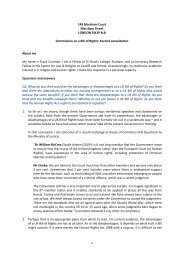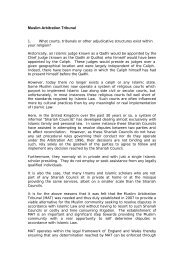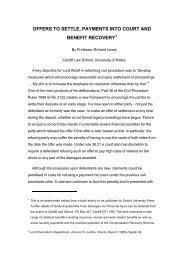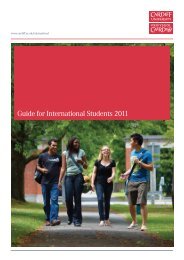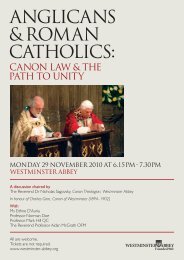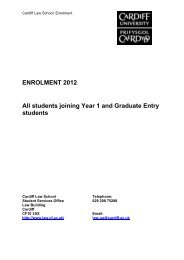Constitutional patriotism - Cardiff Law School
Constitutional patriotism - Cardiff Law School
Constitutional patriotism - Cardiff Law School
You also want an ePaper? Increase the reach of your titles
YUMPU automatically turns print PDFs into web optimized ePapers that Google loves.
ANU E-PressDr Vito Breda<strong>Constitutional</strong> Patriotism & IdentityRosenfeld calls this form of constitutional accommodation ‘comprehensive pluralism’.Comprehensive pluralism requires that all conceptions of the good representedwithin the relevant political order be granted equal consideration, and if possibleequal accommodation. But since in any complex multicultural contemporary politicalsetting it is impossible equally to accommodate all competing conceptions of thegood, comprehensive pluralism seek to strike the best possible balance betweenidentity and difference. 23It might be argued that the present accommodation of religious beliefs is the pragmaticresult of an historically inherited compromise (and we might say that, compromises in adebate over values is a mistake), yet Habermas's deliberative democracy does not yield anappealing alternative. In his deliberative democracy, the acknowledgement of a plurality ofphilosophies of life is militantly neutral, and we are left with the sensation that pluralism isan inconvenient side effect of mass democracy. He suggests that the practice of discussingpolitical arguments should filter out irrational reasons. The issue is whether a deliberativedemocracy might accept a reasoned limit of that practice.Even if we find an agreement regarding the exclusion of religious extremism that denies thebasic principle of deliberative democracy, 24 the specific risk of Habermas's commitment torational neutrality is the possibility of turning the process into a vicious cycle in which areligious group is progressively disenfranchised from mainstream political debates. 25The critique might be downplayed. We might for instance say that in all theories, there isthe possibility of a pragmatic error in their application. It is also not unusual that such errorsmight have long term effects. However, in a political theory that seeks an alternative to theliberal model, overlooking the possible undemocratic side effects of its decisional processmight deal a fatal blow to the persuasiveness of the entire theoretical proposal. Cohen againelucidates the issue in a succinct narrative:The problem is that the discourse principle, which states, again, that practical normsare legitimate if and only if all possibly affected persons could agree to them asparticipants in rational discourses, appears to rely on a highly generic account ofreasons—not an account restricted to political argument in a democracy of equalmembers. But with no restriction on what can count as a reason, *…+ what constrainsthe ‘discursive equilibrium’ in the way that Habermas proposes? 2623 Rosenfeld Michel, 'Habermas's Call for Cosmopolitan <strong>Constitutional</strong> Patriotism in an Age of Global Terror: APluralist Appraisal' (2007) 14(2) Constellations 1, 17224 Michel Rosenfeld, 'Rethinking <strong>Constitutional</strong> Ordering in an Era of Legal and Ideological Pluralism' (2008)6(2) International Journal of <strong>Constitutional</strong> <strong>Law</strong> 415, 3425 Carlos Santiago Nino, The Constitution of Deliberative Democracy (1996)11026 J. Cohen, 'Reflections on Habermas on Democracy' (1999) 12(4) Ratio Juris 385, 3957 | P a g e



